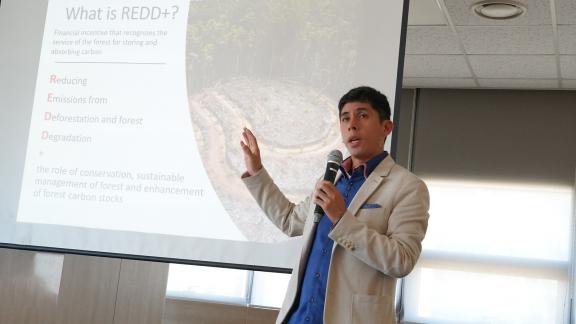Search
If I could time travel: does access to credit help the decision to adapt to climate change in developing countries?
... in our gap-map [1], which will be published soon by the IEU and DEval. In our recent meta-analysis report [2] to be published by the IEU and DEval in the coming weeks, we analyze this ...
Article > Blog 
Independent evaluation of the relevance and effectiveness of the GCF's investments in the LDCs
The least developed countries (LDCs) are responsible for small additions to the overall GHGs stock globally but experience disproportionate impacts of its consequences.
The evaluation asks whether the GCF’s approach and...
Evaluation > Portfolio
Accountability in Climate Action
... of the global effort to tackle climate change. This IEU has completed an independent evaluation to inform ...
Article > Blog 
Going the Last Mile: Behavioural Science and Investments in Climate Change Mitigation and Adaptation (presented at Climate2020 Conference)
The purpose of this paper is to showcase how insights from behavioural science can be a potential solution for this last mile problem. It applies insights from ‘nudges’ and ‘boosting’ for a sample of ten projects by the...
Document > Other publication
REDD+: A global effort to mitigate climate change and protect forests
Juan Chang, Principal Specialist in Forests and Land Use at the Green Climate Fund, provides an overview of REDD+ and its importance in fighting climate change. The talk delves into Juan’s key points on forest...
Event > IEU talk Republic of Korea 
How to bridge the gap between complexity science and evaluation - A new analysis tool as a first step
This paper builds a bridge between the science of complexity and climate change adaptation activities conducted in the field. It provides an introduction to complexity science, introduces a diagnostic tool for mapping...
Document > Learning paper
Behavioural science, decision making and climate investments
This paper builds a bridge between how climate interventions are conceived and implemented and the nascent field of behavioural science as a practical, low-cost but potentially rewarding route for increasing the...
Document > Learning paper
Inception Report for the Independent Review of the Green Climate Fund’s Results Management Framework
This review has two main objectives, one is to assess the design, implementation, and utility of the results management framework of the Green Climate Fund. The second is to support institutional learning by deriving...
Document > Approach paper
GEvalNote 03: LORTA 2019
The multi-year Learning-Oriented Real-Time Impact Assessment (LORTA) programme keeps track of the impact of GCF investments. Its goal is to assist GCF projects measure their impact in lowering greenhouse gas emissions...
Document > Evaluation brief
LORTA Portfolio Brief 2021
The multi-year Learning-Oriented Real-Time Impact Assessment (LORTA) programme keeps track of the impact of GCF investments. Its goal is to assist GCF projects measure their impact in lowering greenhouse gas emissions...
Document > Evaluation brief
Impact Evaluation Report for FP002 : Scaling up the Use of Modernized Climate Information and Early Warning Systems in Malawi
This report assesses the impact of the Green Climate Fund's FP002 "Scaling up the Use of Modernized Climate Information and Early Warning Systems in Malawi". The impact evaluation focuses on the Participatory Integrated...
Document > Impact evaluation report
Impact Evaluation Baseline Report for FP073: Strengthening Climate Resilience of Rural Communities in Northern Rwanda "Green Gicumbi Project"
This report presents the findings of the baseline survey for strengthening climate resilience of rural communities in Northern Rwanda commonly known as the "Green Gicumbi Project".
Document > Evaluation document
Sustainable Landscapes in Eastern Madagascar : Baseline Household Survey Report
This report presents the findings of the baseline household survey for the project "Sustainable Landscapes in Eastern Madagascar" supported by the Independent Evaluation Unit of the Green Climate Fund (GCF) and...
Document > Evaluation document
Impact Evaluation Baseline Report for FP087: Building livelihood resilience to climate change in the upper basins of Guatemala's highlands
This document is the baseline report for the impact evaluation of the project FP087 "Building livelihood resilience to climate change in the upper basins of Guatemala"s highlands". The report outlines the theory of...
Document > Evaluation document
Final Report of the Independent Evaluation of the Relevance and Effectiveness of the Green Climate Fund's Investments in the African States
This independent evaluation assesses whether the GCF’s approach and investments in the African States have been effective in promoting a paradigm shift towards low-emission and climate-resilient development pathways. It...
Document > Evaluation report
Impact evaluation baseline report for FP069: Enhancing adaptive capacities of coastal communities, especially women, to cope with climate change induced salinity
This report presents the baseline data for “Enhancing adaptive capacities of coastal communities, especially
women, to cope with climate change induced salinity”, a project funded by the Green Climate Fund and...
Document > Evaluation document
LORTA Portfolio Update
The multi-year Learning-Oriented Real-Time Impact Assessment (LORTA) programme keeps track of the impact of GCF investments. Its goal is to assist GCF projects measure their impact in lowering greenhouse gas emissions...
Document > Evaluation brief
Impact evaluation report for FP069 — Enhancing adaptive capacities of coastal communities, especially women, to cope with climate change induced salinity in Bangladesh
Document > Impact evaluation report
Document > Impact evaluation report
GEvalNote 04: LORTA 2023
The multi-year Learning-Oriented Real-Time Impact Assessment (LORTA) programme keeps track of the impact of GCF investments. Its goal is to assist GCF projects measure their impact in lowering greenhouse gas emissions...
Document > Evaluation brief
Systematic review: Behavioural science interventions within the development and environmental fields in developing countries
This paper presents a systematic review on behavioural science interventions in the human development and environmental/climate fields in developing countries. The review synthesizes evidence on five specific...
Document > Learning paper
Evidence gap map: Behavioural science interventions within the development and environmental fields in developing countries
The evidence gap map (EGM) presents a report and online resource depicting the landscape of studies on the effectiveness of behavioural science interventions. It finds the most commonly evaluated interventions are...
Document > Learning paper
Approach paper: Evidence review on behavioral change in developing countries
The approach paper clarifies the objectives of the review, the methods applied, and the criteria for inclusion and exclusion of studies. The evidence review and associated brief consolidates evidence on behavioural...
Document > Other publication
Special Study on REDD+ Results-Based Payment Projects in the Latin America and Caribbean Region
The Special Study on REDD+ Results-Based Payment Projects in the Latin America and Caribbean Region report was prepared to assess the relevance, effectiveness, and efficiency of GCF’s investments in REDD+ projects in...
Document > Working paper
Evidence gap map and intervention heat map: Climate change mitigation interventions in the private sector in developing countries
This evidence review describes the evidence base on private sector investment in mitigation and describes the modes of funding for mitigating greenhouse gas emissions.
Document > Learning paper
Approach paper: Evidence review on results-based payments
Results-based payments provide funding conditional on actions undertaken by target beneficiaries and verified by third parties. This approach paper outlines that this evidence review will adopt a broad approach to take...
Document > Other publication
Approach paper: Evidence review on the effectiveness of interventions promoting women's empowerment in developing countries
This evidence review assesses what evidence exists regarding the effectiveness of interventions which seek to promote women’s empowerment. The approach paper details the inclusion/exclusion criteria such as the focus on...
Document > Other publication
Evidence gap map: Interventions for women's empowerment in developing countries
This evidence gap map plots studies on the effectiveness of interventions for women’s empowerment in developing countries. The evidence gap map shows most evidence is from Sub-Saharan Africa and South Asia, especially...
Document > Learning paper
Protocol: Effectiveness of life skills interventions for the empowerment of women in developing countries
The protocol for this evidence review describes the selection of life skills interventions for the meta-analysis. It also explains the methods used for the systematic review.
Document > Other publication
Protocol: Evidence review on coastal and terrestrial water-sector interventions in developing countries
Global water resources are severely affected by the changing climate. However, our understanding of the impact of key interventions, particularly in coastal zones and certain types of terrestrial water projects, is...
Document > Other publication
Systematic review: Coastal and terrestrial water sector interventions in developing countries
Based on a rigorous protocol and companion evidence gap map, our systematic review conducts meta-analyses of water sector interventions in four areas: built infrastructure, nature-based options, institutional...
Document > Learning paper Pages
Filter by type
Filter by Subtype
Filter by Country
Filter by date